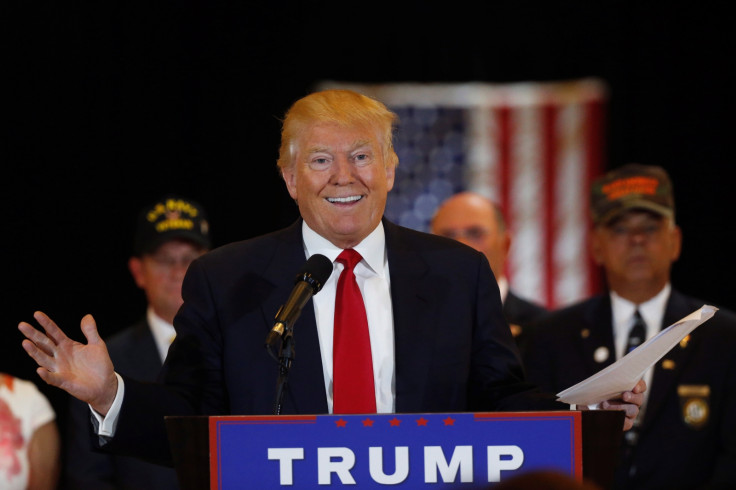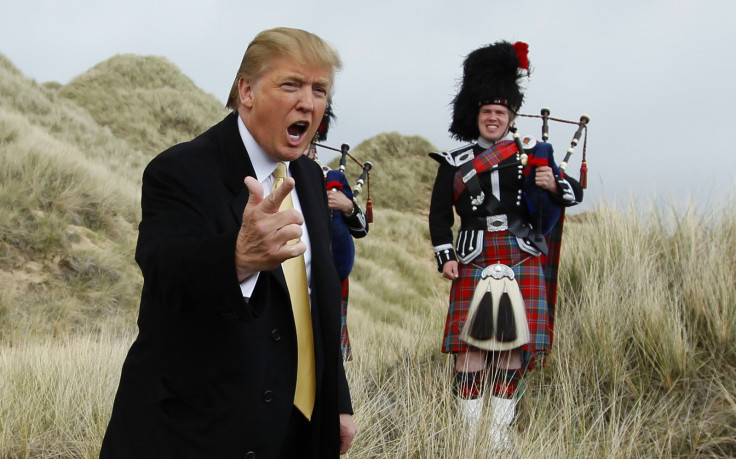Donald is coming! Will the Trump Effect grip the United Kingdom?

At the start of 2016, the "Trump Effect" in Britain aroused mostly disdain and protest. When he arrives in the UK on 24 June, it will be interesting to see if the British public has changed its mind.
In January, MPs were forced to debate a ban on the billionaire from coming to the UK after he called for a temporary halt on Muslims entering the US. An e-petition started the previous month gathered 575,000 signatures, nearly six times the number needed.
There was of course no vote and Trump wasn't listening anyway as he plans to come to Ayrshire for the relaunch of the Turnberry golf resort in which he invested £200 million. Unlike six months ago, he is now the Republican candidate and he may finally have that awkward conversation with David Cameron who also took exception to his comments.
If it's true that when America sneezes the rest of the world catches cold, could the echo of Trump's tub thumping cause ripples in politics on this side of the pond?
Although the rise of anti-establishment figures like Trump and the Democrat Bernie Sanders has mirrored the success of the leaders of the Labour and Ukip parties, news editor at the London think-tank the Institute For Economic Affairs, Kate Andrews, said the similarities end there.
"I am hesitant to compare Donald Trump to any person in the UK. I think his blatant xenophobia and sexism is just really difficult to pin on anybody in particular in the UK, where there is a more thoughtful political process," she told IBTimesUK.
"We are seeing in the UK and the US the rise of the anti-establishment voter. People on both sides being disenchanted with the political parties. Jeremy Corbyn (Labour) and Nigel Farage (Ukip) are both examples of that, as are Sanders and Trump, but it is very hard to directly compare the political parties or the characters," she said.
Immigration

As it is stateside, immigration is at the heart of any election campaign, but for Britain the stakes are whether it remains in the EU. A YouGov poll in December 2015 found that Ukip supporters thought Trump's position on immigration was appropriate.
The language about immigration used by Brexit-ers like Boris Johnson even led Tory grandee Ken Clarke to dub the former London mayor as a "nicer version of Donald Trump".
By coincidence or design, Trump arrives in Scotland on the day of the EU referendum result, meaning that David Cameron might be otherwise engaged anyway.
Ian Scott, senior American politics lecturer at Manchester University, said that while Trump will make headlines, his political influence on discourse in the UK will be limited.
"People may point to Boris Johnson, who is larger than life and ebullient. But Trump exists in a federal system where he is not beholden to any system and he can build bases and form coalitions and he has done all of that against any kind of prediction.
"That is much harder to do in the UK, it is harder to build a base on your own," he said.
Professor of modern American history at Sussex University, Clive Webb said the innovations of the Trump campaign could be emulated in the UK but they will not have the same impact politically.
"There is a seething cult of discontent in the UK toward the political establishment, the rise of Ukip, the possibility of Brexit. I think there is quite a long way to go to get into a situation quite the same as the US where there is a sense of disempowerment."
He pointed out that whatever the unease at the role that Brussels plays in British politics, the UK government works, while the perception in the US is that its political system is dysfunctional.
"David Cameron can more or less command a majority and allow the government pursue its agenda. In the US, where you can have a house and a Senate controlled by the Republicans but with a Democrat in the White House, there is capacity for gridlock and obstructionism, so the levels of anger and frustration are more acute in the United States than in Britain at the moment," he said.
The 'special relationship'
Even if there may not be a British Trump in the near future, many have speculated what a Trump presidency would mean for relations between Britain and the United States, especially since Cameron would not apologise for his comments that Trump was "divisive, stupid and wrong" about the temporary block of Muslims.
The special relationship thrives in a context where there is a good rapport between the leaders of the UK and the US and so Cameron, if he remains prime minister and Trump, would have to try to make things to work.
Kate Andrews from the Institute For Economic Affairs said that the relationship would endure above and beyond of whoever is in power.
"If Donald Trump is elected president of the United States, we will have a different relationship with everybody in the rest of the world. My guess is that the UK government will speak to and try to cooperate with Donald Trump.
"The presidency can only be held for eight years, I think the relationship between America and the UK has a strong history and its future will be strong as well," she said.
This is part of a week-long series about Generation Trump by IBTimes UK.
© Copyright IBTimes 2025. All rights reserved.






















